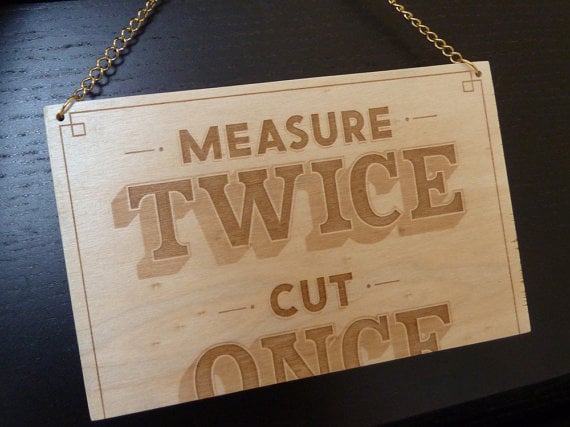Computer related:
- Don’t be your family computer savy guy, you just found yourself a bunch payless jobs…
- Long desks are cool and all, but the amount the space they occupy is not worth it.
- Block work related phone calls at weekends, being disturbed at your leisure for things that could be resolved on Mondays will sour your day.
Buying stuff:
- There is expensive because of brand and expensive because of material quality, do your research.
- Bulk buying is underrated, save yourself a few bucks, pile that toilet paper until the ceiling is you must.
- Second hand/broken often means never cleaned, lubricated or with easy fixable problem.
Water dripping? Don’t call a plumber yet. Get on your hands and knees and try to figure out exactly where the water is coming from. You might need a $5 part and 10 minutes watching a YouTube video instead of a $400 callout. The same concept applies for most things in a home or vehicle. But don’t screw around with electricity if you don’t know what you’re doing.
If you’re shopping around based on price, make sure you’re factoring in the cost of gas and your time. Driving an hour to save $5 actually costs you money.
Need to quickly determine if a caller is a scammer or legitimate? Just ask who they’re calling. If they don’t know your name, you can hang up immediately.
Maintain your things. All your things. If you use something until it’s no longer working, it has moved from inexpensive maintenance to expensive repair.
When driving don’t be nice, be predictable.
Eg.: If you are on the priority road, drive - don’t be nice and slow down to let someone in from a side road. That’s how you get rear-ended.
My main transport is a bicycle. I do my best to be predictable, and obvious about it. And when someone tries to ‘be nice’ and let me go first when it’s not my ‘turn’ / right of way, I start with all sorts of body language that says I’m not moving till after you do. Put my foot down, look at the sky, look 180 degrees away from the ‘nice’ car, look in the direction the ‘nice’ car is supposed to go, point in the direction they are supposed to go, shake my head point at the ground, cross my arms, etc, etc till they give up and just go. I’ve even had the opportunity to verbally explain the importance of predictability and Right of Way, but it usually doesn’t go that far. LoL, we all just want to get where ever in the heck we are trying to get to, after all.
Memento mori.
I usually twist this into “memento mori, quoque uiuere” (remember [that you’ll] die, also [that you’ll] live).
Like, not trying to become worm food full of regrets is nice and dandy, but remember that you’ll suffer the consequences of a few of your actions while you’re still alive.
Inventory is waste.
Why ? Unless you are talking store inventory you might have some reason.
Not just stores, but inventory of goods in general. The thought is that resources spent on inventory are resources which could have otherwise been spent elsewhere. This line of thinking and fixation on Just-In-Time goods deliveries was one of the most important factors in the supply chain fuckery around covid, which only began to stabilize last year.
excess inventory is waste. Always have a buffer to handle shenanigans and/or be able to source the next thing,and avoid being up shit creek the next time the TP truck is a week late.
Explain.
For me, inventory is a way to save money, save time, and it gives you a buffer when shortages happen.
This is at the expense of space, so if you have free (wasted) space, you might as well take advantage of it.
It’s an idea from Lean management. Everything you need to keep, prevents you from keeping something else; requires you to remember where it is, where you could be remembering something else; takes longer to move when you have to move it; takes longer to organise than having less would. It poses fire hazards that having nothing wouldn’t pose. Blocks light that having nothing wouldn’t block. Keeping stuff is inherently wasteful.
None of this is to say that keeping stuff is bad. It may be very useful to keep it. But you should always recognise that doing so incurs a cost that you need to trade off against its usefulness.
While we’re on it, inventory is one of the eight kinds of waste identified in Lean. They are:
- Transportation
- Inventory
- Motion
- Waiting
- Overproduction
- Overprocessing
- Defects
- Skills (misuse of)
Remember TIM WOODS.
All of this is meant for running a factory, but I’ve found a lot of them useful in other bits of life, especially the idea that Inventory is a form of waste.
I guess the context in which this is applied to makes the difference.
In my home, I’m fine with keeping inventory when it makes sense.
Non perishable food, for example, has it’s own happy place in a corner of my home that wouldn’t otherwise be utilized. Stocking up on this inventory has demonstrably saved a lot of money vs. buying when needed.
During covid, my stockpiling years before allowed me to essentially not run out of anything or pay a premium on things that were either not available or overpriced during the first year of the pandemic.
Keeping a stockpile also means that I’m not wasting time, gas, energy, or money running out multiple times a week to pick up necessities. I just take from my inventory, which would be at a lower price than the current price, and I move on with my day.
If I had to only buy certain things when needed, I estimate that I’d likely be overspending by at least 30% + whatever time and transportation costs to make those errand runs.
When you feel like it’s an easy one for once, it might be so but you’ll still flunk it if you think so.
“Measure twice, cut once.”

I cut it twice and it’s still too short!
When someone has had a health issue, ask the people around them how those people are doing. When I was first diagnosed with epilepsy, a person asked my mom specifically how she was doing. She hadn’t really stopped to reflect on her own emotional state because she had been so focused on me. It was a great comfort to have someone guide her through thinking about herself.
Proof-read your writing; even when writing titles.
A good exercise is to read your essay from the bottom up. Start at the last complete sentence and when you’re done read the one above. You’ll catch more things that way because your mind has to change the perspective.
Unless you make a scene, nobody pays any attention to you ever, or will remember you later. You are invisible and anonymous in public.
As long as nobody is recording and giving your data to companies that have resources to analyze ever pixel of you ten times over.
They may know my speed or my position, but not both at once.
shakes fist
HEISENBEEEEEEERG!!!
You don’t have to have an opinion about everything.
That’s quitter talk!
i disagree.
All the people up voting this just don’t get it.
“A man’s mind changed against his will is of the same opinion still.”
The only argument you win is the one you avoid.
Life exists within the grey area that is constantly bombarded by polarized extremism. Don’t buy into the “all” mentality. Because in reality it’s always just “some.”
Assume the best of people and the worst of circumstances. It just makes my life a little bit happier giving my friends and family, and even strangers, the benefit of the doubt.
Attribution bias. We have a tendency to attribute our own behaviours to external circumstances (“I’m driving slowly because I have good reason”) whilst attributing others’ behaviours to personal traits (“That person is driving slowly because they are incompetent”). It’s nice to remember that situational factors may be affecting a good person’s behaviour.
Frozen veggies have all the nutrients of fresh, and will still have them when you finally get around to cooking them.
Rice is a cereal and therefore a valid breakfast food. Fry last night’s rice with some chopped veg and garlic salt for a nutritious and easy breakfast.





